De Amerikaanse schrijver en essayist Edmund White werd geboren op 13 januari 1940 in Cincinnati. Zie ook alle tags voor Edmund White op dit blog.
Uit: Hotel de Dream
„Cora never thought for a moment that her young husband could die. Other people—especially that expensive specialist who’d come down for the day from London and stuck his long nose into every corner of Brede Place and ended up charging her fifty pounds!—he’d whispered that Stevie’s lungs were so bad and his body so thin and his fever so persistent that he must be close to the end. But then, contradicting himself, he’d said if another hemorrhage could be held off for three weeks he might improve.
It was true that she had had a shock the other day when she’d bathed Stephen from head to foot and looked at his body standing in the tub like a classroom skeleton. She’d had to hold him up with one hand while she washed him with the other. His skin was stretched taut against the kettledrum of his pelvis.
And hot—he was always hot and dry. He himself said he was “a dry twig on the edge of the bonfire.”
“Get down, Tolstoi, don’t bother him,” Cora shouted at the tatterdemalion mutt. It slipped off its master’s couch and trotted over to her, sporting its feathery tail high like a white standard trooped through the dirty ranks. She unconsciously snuggled her fingers under his silky ears and he blinked at the unexpected pleasure.
The newspapers kept running little items at the bottom of the page headlined, “Stephen Crane, the American Author, Very Ill.” The next day they announced that the American author was improving. She’d been the little bird to drop that particular seed about improvement down their gullets.
Poor Stephen—she looked at his head as he gasped on the pillow. She knew that even in sleep his dream was full of deep, beautiful thoughts and not just book-learning! No, what a profound wisdom of the human heart he’d tapped into. And his thoughts were clothed in such beautiful raiments.“
Edmund White (Cincinnati, 13 januari 1940)
De Amerikaanse schrijver Jay McInerney werd geboren op 13 januari 1955 in Hartford, Connecticut. Zie ook alle tags voor Jay McInerney op dit blog.
Uit: Bright Lights, Big City (Vertaald door A. Visser)
„Het is zes uur ’s morgens. Weetje waar je bent? Je bent niet het type dat om deze tijd ’s morgens in een tent als deze rondhangt. Maar je bent er, en je kunt niet zeggen dat het terrein totaal onbekend is, hoewel de details een beetje wazig zijn. Je zit in een nachtclub te praten met een meid met een kaal hoofd. De club is óf de Heartbreak óf de Lizard Lounge. Alles zou duidelijk worden als je even het toilet kon binnenglippen en nog een beetje Boliviaans Marspoeder kon innemen. Of misschien ook niet. Een stemmetje in je hoofd blijft volhouden dat t epidemisch gebrek aan helderheid het resultaat van een al te rijkelijk gebruik van neusmiddelen is. De nacht heeft reeds die niet waarneembare wenteling gemaakt waarin twee uur verandert in zes uur ’s morgens. Je weet dat dat moment al voorbij is, maar je hebt geen zin toe te geven dat je over de streep bent gegaan, waarachter alles nodeloze schade is en de verlamming van rafelige zenuweinden. Een tijdje geleden had je het zinkende schip kunnen verlaten, maar in plaats daarvan ben je dat moment gepasseerd op een kometenstaart van wit poeder en probeer je op de flash daarvan door te jagen. Op moment zijn je hersenen een samenstel van brigades Boliviaanse soldaatjes. Ze zijn moe en zitten onder de modder van hun lange nachtelijke mars. Ze hebben gaten in hun laarzen en honger.”

Jay McInerney (Hartford, 13 januari 1955)
De Duitse schrijver Daniel Kehlmann werd op 13 januari 1975 in München geboren. Zie ook alle tags voor Daniel Kehlmann op dit blog.
Uit: Die Vermessung der Welt
“Im September 1828 verließ der größte Mathematiker des Landes zum erstenmal seit Jahren seine Heimatstadt, um am Deutschen Naturforscherkongreß in Berlin teilzunehmen. Selbstverständlich wollte er nicht dorthin. Monatelang hatte er sich geweigert, aber Alexander von Humboldt war hartnäckig geblieben, bis er in einem schwachen Moment und in der Hoffnung, der Tag käme nie, zugesagt hatte.
Nun also versteckte sich Professor Gauß im Bett. Als Minna ihn aufforderte aufzustehen, die Kutsche warte und der Weg sei weit, klammerte er sich ans Kissen und versuchte seine Frau zum Verschwinden zu bringen, indem er die Augen schloß. Als er sie wieder öffnete und Minna noch immer da war, nannte er sie lästig, beschränkt und das Unglück seiner spät
en Jahre. Da auch das nicht half, streifte er die Decke ab und setzte die Füße auf den Boden.
Grimmig und notdürftig gewaschen ging er die Treppe hinunter. Im Wohnzimmer wartete sein Sohn Eugen mit gepackter Reisetasche. Als Gauß ihn sah, bekam er einen Wutanfall: Er zerbrach einen auf dem Fensterbrett stehenden Krug, stampfte mit dem Fuß und schlug um sich. Er beruhigte sich nicht einmal, als Eugen von der einen und Minna von der anderen Seite ihre Hände auf seine Schultern legten und beteuerten, man werde gut für ihn sorgen, er werde bald wieder daheim sein, es werde so schnell vorbeigehen wie ein böser Traum. Erst als seine uralte Mutter, aufgestört vom Lärm, aus ihrem Zimmer kam, ihn in die Wange kniff und fragte, wo denn ihr tapferer Junge sei, faßte er sich. Ohne Herzlichkeit verabschiedete er sich von Minna; seiner Tochter und dem jüngsten Sohn strich er geistesabwesend über den Kopf. Dann ließ er sich in die Kutsche helfen.
Die Fahrt war qualvoll. Er nannte Eugen einen Versager, nahm ihm den Knotenstock ab und stieß mit aller Kraft nach seinem Fuß. Eine Weile sah er mit gerunzelten Brauen aus dem Fenster, dann fragte er, wann seine Tochter endlich heiraten werde. Warum wolle die denn keiner, wo sei das Problem?
Eugen strich sich die langen Haare zurück, knetete mit beiden Händen seine rote Mütze und wollte nicht antworten.”

Daniel Kehlmann (München, 13 januari 1975)
De Amerikaanse schrijfster Lorrie Moore werd geboren op 13 januari 1957 in Glens Falls, New York Lorrie Moore schrijft regelmatig voor The New Yorker. Ze heeft vier verhalenbundels op haar naam staan: ‘Self help’ (1985) ‘Like life ‘(1990), Birds of America (1998) en The Collected Stories (2008). Daarnaast schreef ze romans, waaronder ‘Anagrams’(1986) en ‘Who will run the frog hospital?‘(1994)
Uit: Who Will Run the Frog Hospital
„IN PARIS we eat brains every night. My husband likes the vaporous, fishy mousse of them. They are a kind of seafood, he thinks, locked tightly in the skull, like shelled creatures in the dark caves of the ocean, sprung suddenly free and killed by light; they’ve grown clammy with shelter, fortressed vulnerability, dreamy nights. Me, I’m eating for a flashback.
“The grass is always greener on the other side of the fence,” says Daniel, my husband, finger raised, as if the thought has just come to him via the cervelles. “Remember the beast you eat. And it will remember you.”
I’m hoping for something Proustian, all that forgotten childhood. I mash them against the roof of my mouth, melt them, waiting for something to be triggered in my head, in empathy or chemistry or some other rush of protein. The tempest in the teacup, the typhoon in the trout; there is wine, and we drink lots of it.”
Lorrie Moore (Glens Falls,13 januari 1957)
De Litouwse schrijver en vertaler Jurgis Kunčinas werd geboren op 13 januari 1947 in Alytus. Hij studeerde germanistiek aan de universiteit van Vilnius, maar werd in 1968 uitgeschreven toen hij weigerde de verplichte militaire cursus te volgen. Zijn dienstplicht moest hij vervolgens bij de luchtmacht vervullen. Daarna had hij allerlei baantjes. Van vertaler bij kranten tot verpleger, transportarbeider tot reisleider. Vanaf 1977 publiceerde hij zes dichtbundels, zeven bundels met essays en proza en zes romans. Sinds de jaren tachtig werkte hij als zelfstandig schrijver. Zijn roman Tūla werd in 1993 door de Litouwse schrijversbond uitgeroepen tot het beste boek van het jaar.
Uit: Was wir in den Taschen eines Toten fanden (Vertaald door Cornelius Hell)
“Schon den dritten Tag glitten wir auf Schiern die Flüsse entlang: Der schmelzende Schnee erstarrte nachts wieder zu einer Eiskruste, und die quellenreichen Uferhänge froren zu. Der Fluss stieg bis zu den Ufern an. Die Wege der Fischer waren überschwemmt, es war schwer durchzukommen. Dafür hielt uns niemand auf, man musste weder eine Berechtigungskarte noch den Pass noch die Geschlechtsorgane herzeigen. Sonst war es die reinste Mühe und eine ständige Spannung.
Schwer entfachte ich ein Lagerfeuer, und als ich es entfacht hatte, war ich trotzdem noch immer unruhig – es hatte sich das ernstzunehmende Gerücht verbreitet, dass in der Umgebung aus Weißrussland kommende Kurdenbanden wüteten: Sie würden Menschen ausrauben, Tiere abstechen, Frauen, Männer und sogar Kinder vergewaltigen. Andere sprachen, dass das, hörst du, eine von irgendwo aus dem Ural kommende Gruppe bis zu den Zähnen bewaffneter Verbrecher sei – die pfiffen auf jedes Recht und Gesetz. Trotzdem vermieden wir beide offizielle Posten, Siedlungen, öffentliche Wege und Kreuzungen.
Wir gingen zu zweit: Doloresa Lust und ich. Ich war blöd, dass ich einwilligte, sie aus der Stadt hinaus zu bringen. Denn auch dort nährte man sich von Gerüchten. Es verbreitete sich das folgende: Alle, die irgendwann in einem Irrenhaus gastiert oder die in längst vergangenen Zeiten auf der Liste der Vorgemerkten gestanden hatten, beabsichtige die neue Regierung, wieder hinter einen Zaun zu sperren, streng zu kontrollieren und wiederum mit irgendwelchen neuen Medikamenten zu behandeln. Offiziell hieß die Aktion: Schützen wir die Gesellschaft vor psychisch kranken Personen! “
Jurgis Kunčinas (13 januari 1947 – 13 december 2002)
De Amerikaanse dichter, schrijver en beeldhouwer Clark Ashton Smith werd geboren in Long Valley (Californië) op 13 januari 1893. Smith woonde lange tijd bij zijn ouders en volgde alleen de basisschool-onderwijs. Hij leerde zichzelf de Franse en Spaanse taal. Zijn fotografisch geheugen stelde hem in staat veel informatie uit woordenboeken en encyclopedieën te onthouden. Vanaf zijn elfde jaar begon hij sprookjesachtige verhalen te schrijven. Later schreef hij ook gedichten, waardoor hij de aandacht trok van schrijver H.P. Lovecraft, waarmee een vele jaren durende vriendschap en correspondentie begon. Hij verdiende weinig met zijn schrijven en was vaak genoodzaakt bijbaantjes te nemen om zichzelf en zijn ouders te onderhouden. Na de dood van zijn ouders trouwde hij in 1954 met Carol Jones Dorman. Tot 1925 maakte hij vooral gedichten. De volgende tien jaar schreef hij diverse fantasy verhalen, die zich afspeelden in Atlantis, op Mars, in Hyperborië en zijn bekendste werk: de Zothique verhalen. Na 1935 verflauwde zijn belangstelling voor het schrijven en begon hij met beeldhouwen.
After Armageddon
God walks lightly in the gardens of a cold, dark star,
Knowing not the dust that gathers in His garments’ fold;
God signs Him with the clay, marks Him with the mould,
Walking in the fields unsunned of a sad, lost war,
In a star long cold.
God treads brightly where the bones of unknown things lie,
Pale with His splendor as the frost in a moon-bleached place;
God sees the tombs by the light of His face,
He shudders at the runes writ thereon, and His shadow on the sky
Shudders hugely in space.
God talks briefly with His armies of the tomb-born worm,
God holds parley with the grey worm and pale, avid moth:
Their mouths have eaten all, but the worm is wroth
With a dark hunger still, and he murmurs harm
With the murmuring moth.
God turns Him heavenward in haste from a death-dark star,
But His robes are assoilèd by the dust of unknown things dead;
The grey worm follows creeping, and the pale moth has fed
Couched in a secret golden fold of His broad-trained cimar
Like a doom unsaid.
Clark Ashton Smith (13 januari 1893 – 14 augustus 1961)
De Nieuwgrieks dichter Kostís Palamás werd geboren op 13 januari 1859 in Patra in een familie van intellectuelen uit Mesolongi, de stad waar hij ook zijn jeugd heeft doorgebracht. Mesolongi heeft ook zijn gedachtegoed vervuld met herinneringen aan de onafhankelijkheidsoorlog. Hij studeerde rechten in Athene, maar nam nooit deel aan de eindexamens. Hij werd journalist en kreeg een secretariaatsjob aan de Atheense Universiteit. Hij begon zijn literaire loopbaan met satische verzen tegen de toestanden in Griekenland. Hij bestudeerde de principes van de Franse poëtische scholen, o.a. de Parnassiens en de Symbolisten. In 1886 gaf hij een bundel De Gedichten van mijn Vaderland uit, die het begin was van de School van Athene. Palamás zocht zijn inspiratie niet alleen in de volkspoëzie, hij hield zich ook bezig met algemene problemen, zowel in Griekenland als in de rest van de wereld. Palamás schreef ook de tekst voor de Olympische Hymne, gecomponeerd door Spyridon Samaras, en voor het eerst ten gehore gebracht tijdens de zomerspelen van 1896.
On the trip you are taken
On the trip you are taken
By the horseman of the night
Anhything he offers you
You must refuse outright
And if you thirst don’t drink
From the world below
The forgetfulness cursed drink
Poor uprooted mistletoe!
Do not drink totally and forget us
Leave behind your marks
To find the way to get t’us
And as small as you still are
And as a swallow light
And hero’s noisy arms
Don’t hang on your side
Do your best to fool
The sultan of the night
Slide quietly, in stealth
And fly to the upper light,
And in our broken home,
Return, oh darling mine,
And become a gentle wind
Sweetkissing us one more time.
Athens
Here heaven everywhere, sun shining from all sides,
Completely surrounded by something like the honey of Hymettus,
Everlasting lilies grow from the marble,
The bright marble of Pentelicon they made gods from.
The pickaxe, swung, stumbles upon Beauty,
Those are gods, not mortals, in the belly of the Great Mother,
The blood of Athens spills, a violet flood,
When she’s struck by the arrows of the twilight.
Here are the temples and the groves of sacred olive,
Here among the crowd, the crowd that stirs itself
Slowly as a caterpillar on a whiteflower.
A host of relics lives and rules, thousand-souled,
Life-breath bright in the very ground,
I feel it – it wrestles the darkness within me.
Kostís Palamás (13 januari 1859 – 27 februari 1943)
De Nederlandse historicus en dichter Jan de Bas werd geboren op 13 januari 1964. Zie ook mijn blog van 13 januari 2008.
Vogelperspectief
In de tuin zit
een merel op
een tak en hij
kijkt om zich heen
en hij ziet wat
hij denkt en hij
denkt wat hij ziet.
En de merel
gaat verzitten
en hij denkt wat
hij ziet en hij
ziet wat hij denkt.
Jan de Bas (13 januari 1964)
De Duitse schrijver Karl August Bleibtreu werd geboren op 13 januari 1859 in Berlijn als zoon van de bekende schilder Georg Bleibtreu. Zijn studie filosofie brak hij af om door Europa te gaan reizen. In 1886 verscheen zijn brochure Revolution der Literatur. Het was een program voor het naturalisme en hij werd er beroemd mee. Zelf beschouwde hij zich als opvoerder, leider en zelfs verlosser van de literatuur, maar met zijn geldingsdrang en intolerantie maakte hij ook veel vijanden.
Uit: Größenwahn
»Ja, heut ist in Calais Probeschießen mit den neuen Sprenggeschossen und dem neuen Gewehr!« erläuterte der würdige Hafenoffizial, und indem er ein prüfendes Auge auf Graf Xaver warf, der seinem Gepäckträger soeben ein überflüssig hohes Trinkgeld reichte, fügte er dienstbeflissen hinzu: »Die englischen Herren Offiziere brauchen sich blos beim Herrn Colonel zu melden, dann können sie die Revue in der Nähe besehn.«»So?« brummte Krastinik, während sein gleichgültiger Blick über das vorbeidefilierende reitende Artillerieregiment hinglitt. »Ich bin aber keiner.« Sein zweifelhaftes Englisch bürgte auch dafür. Der Beamte verbeugte sich. Sein Irrthum mochte für die oberflächliche Beobachtung eines Franzosen verzeihlich sein. Denn Graf Xaver Krastinik schien mit peinlicher Sorgfalt möglichst englisch gekleidet, von dem glänzenden breitkrämpigen Cylinder bis zu den hackenlosen knappanschließenden Schnürenschuhen. Aber die untersetzte breitschulterige Gestalt von kaum Mittelgröße, die sonnenverbrannte Hautfarbe, die tiefliegenden scharfen Augen unter hervorstehendem Knochenbau der Stirn, der röthliche Vollbart und das braunrote kurzgeschorene Haar, endlich die markirten Züge verriethen einen sarmatischen Typus. Auch soldatische Haltung konnte man unmöglich verkennen.Die Sonne blinzelte grell auf die Bohlen der Holzbrücke, welche zur Landungsstelle, wo der Dampfer via Calais-Dover seine Opfer erwartet, hinlief. Ohnehin verdrießlich, fühlte sich der Graf peinlich berührt, als ihm der dort lauernde Beamte, ein stämmiger Kerl mit riesigem Knebelbart, die gewöhnliche Frage zuschnarrte: »Êtes vous Français?« Da der Ueberraschte nicht sogleich antwortete, fuhr der Inquisitor eindringlich in einem Athem fort: »Are you English? Votre nom, monsieur? Your name, sir?«

Karl Bleibtreu (13 januari 1859 – 30 januari 1928)
De Franse dichter en criticus Victor Richard de Laprade werd geboren op 13 januari 1812 in Montbrison. Hij studeerde in Lyon. Bekend werd hij met de bundel Les Parfums de Madeleine uit 1839, een verzameling religieuze gedichten. In 1840 volgde La colère de Jesus, in 1844 Odes et poèmes.In 1847 werd hij benoemd tot hoogleraar Franse literratuur in Lyon.
Les Parfums De Madeleine (fragment)
En ce temps-là, ce fut une joie infinie
Chez tous les habitants du bourg de Béthanie:
Un pasteur avait vu, loin des chemins foulés,
Des voyageurs pensifs venir le long des blés,
Et, courant le premier, à la foule jalouse
Il avait annoncé le Seigneur et les Douze.
Or, comme aux jours anciens, par les vieillards rangé,
Le peuple s’assemblait près d’un puits ombragé;
Et marchant vers Jésus, les enfants et les femmes,
Dont sa voix caressait si doucement les âmes,
Répandaient à ses pieds les palmes d’Amana,
Se pressaient pour l’entendre et criaient: Hosanna!
Et la joie éclatait, plus féconde et plus vive,
Sous le toit où devait s’asseoir un tel convive.
Chez Simon qu’il aimait et qu’il avait guéri,
Les élus attendaient l’hôte illustre et chéri;
Et, mêlant de doux soins au chant des saints cantiques,
Des vases solennels puisaient les vins antiques.
Victor de Laprade (13 januari 1812 – 13 december 1883)
De Oostenrijkse dichter en schrijver Eduard von Bauernfeld werd geboren op 13 januari 1802 in Wenen. Tot 1848 werkte hij als ambtenaar in staatsdient, daarna als zelfstandig schrijver. Hij werd een van de succesvolste blijspeldichters van Oostenrijk en werd de huisdichter van het Burgtheater, waar zijn stukken toto 1902 zo’n 1100 opvoeringen beleefden. Enkele van zijn gedichten werden door Schubert op muziek gezet.
Der Vater mit dem Kind
Dem Vater liegt das Kind im Arm,
Es ruht so wohl, es ruht so warm,
Es lächelt süß; lieb’ Vater mein!
Und mit dem Lächeln schläft es ein.
Der Vater beugt sich, atmet kaum,
Und lauscht auf seines Kindes Traum;
Er denkt an die entschwund’ne Zeit
Mit wehmutsvoller Seligkeit.
Und eine Trän’ aus Herzensgrund
Fällt ihm auf seines Kindes Mund;
Schnell küßt er ihm die Träne ab,
Und wiegt es leise auf und ab.
Um einer ganzen Welt Gewinn
Gäb’ er das Herzenskind nicht hin.
Du Seliger schon in der Welt,
Der so sein Glück in Armen hält!
Eduard von Bauernfeld (13 januari 1802 – 9 augustus 1890)
De Duitse dichter en schilder Maler (Friedrich) Müller werd geboren op 13 januari 1749 in Kreuznach. Hij werd opgeleid tot schilder in Zweibrücken en werd in 1777 benoemd tot hofschilder in Mannheim. In 1778 trok hij naar Italië waar hij bleef wonen. In 1778 werd hij katholiek. Voordat hij Duitsland verliet had hij ook al geschreven, o.a. het fragment „Fausts Leben dramatisirt“. Müller stond in contact met de groten uit zijn tijd als zu Gotthold Ephraim Lessing, Christoph Martin Wieland und Friedrich Schiller, en Johann Wolfgang von Goethe.
Trinklied deutscher Künstler in Rom
Laßt in Rom beim Saft der Reben,
Brüder, fröhlich heut’ uns sein,
Da die Parzen noch das Leben
Zugemessen uns verleihn.
Morgen kann das Grab uns decken
Oder doch das Scheiden schrecken:
Drum soll heute frisch und rein,
Zum Gesang die Lust uns wecken!
Recht so, Brüder, ohne Säumen
Reiche jeder her die Hand.
Fröhlich laßt den Becher schäumen,
Angefüllet bis zum Rand.
Deutschland hoch! Hoch deutsche Treue!
Reicht die Händ’ euch, schwört aufs neue,
Treu zu sein dem Vaterland!
Deutsche Kunst geb’ uns die Weihe!
Maler Müller (13 januari 1749 – 23 april 1825)
Zie voor onderstaande schrijver ook mijn blog van 13 januari 2007.
De Schotse dichter Mark Alexander Boyd werd geboren op 13 januarri 1562.
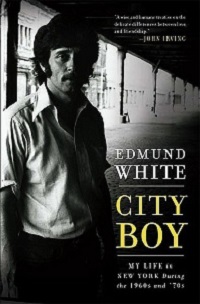

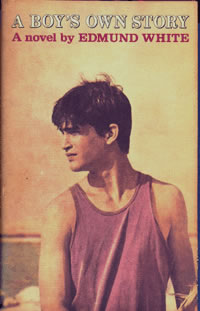
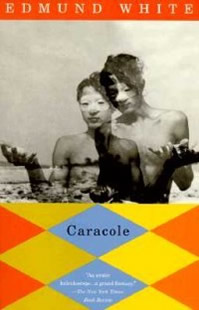
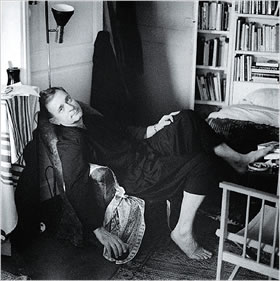
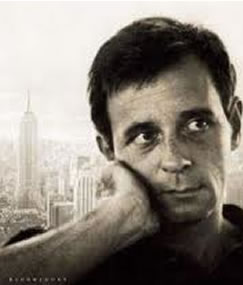






![edmundwhite[1] edmundwhite[1]](https://romenu553547602.files.wordpress.com/2009/01/e3cdd-dyn005_original_264_265_pjpeg_2535747_76981fb91511ae3ff95a9f8d42e89cba.jpg)

















